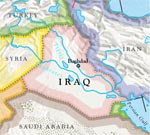Iraq's al-Maliki delays school exams for Mosul operation
 Baghdad - Iraq's Prime Minister Nuri al-Maliki postponed on Tuesday school exams until June due to a security operation launched against members of the al-Qaeda terrorist network and illegal militants in the northern city of Mosul, media reports said.
Baghdad - Iraq's Prime Minister Nuri al-Maliki postponed on Tuesday school exams until June due to a security operation launched against members of the al-Qaeda terrorist network and illegal militants in the northern city of Mosul, media reports said.
Essam al-Moawen, an official in the Iraqi Education Ministry, told the Voices of Iraq (VOI) news agency that al-Maliki approved the delay in the exams at almost all school grades in the province of Nineveh owing to a security offensive and a curfew imposed in the area.
On Saturday, the Iraqi government announced the launch of a security operation in Mosul that is aimed at clearing the city of all al-Qaeda militants and criminal gangs.
However, al-Maliki said that the offensive had not yet started, but introductory military operations had been conducted.
The actual launch of the offensive would be announced as the preliminary operations end, al-Maliki said.
Mowafaq al-Rabeiy, an Iraqi official, told Deutsche Presse-Agentur dpa that the operation in Mosul would be considered "a shock for all al-Qaeda cells."
He added that the leadership of the al-Qaeda network had become weaker.
Osama al-Najifi, a parliament member and resident of Mosul, told dpa that the operation in Mosul would be similar to the previous ones launched in Basra and Sadr City.
The main security problem in Mosul was the presence of Kurdish militiamen who threatened stability and safety, al-Najifi said.
"Some 90 per cent of the violence attacks in Mosul is caused by the Kurdish militia, and we have previously informed al-Maliki about this," the member of parliament said.
Separately, the radical Shiite cleric Moqtada al-Sadr on Tuesday called upon his followers to abide by an agreement, signed between Sadrist movement and the United Iraqi Alliance, to stop fighting in Sadr City.
Al-Sadr urged his Shiite followers to implement the agreement, which encapsulates 16 articles and should last for only four days, according to a statement written in his handwriting.
Khalid Attiya, an official in the United Iraqi Alliance, told the media on Tuesday that the governmental-Sadrist agreement achieved peace on both sides and settled tensions in Sadr City, in eastern Baghdad.
The Sadrist movement stated in the agreement that heavy weapons would not be held and bombs would be removed from streets around Sadr City.
Sadr City has witnessed heavy clashes between the Mahdi Army, loyal to al-Sadr, and the Iraqi government since March 25.
The fighting has resulted in the deaths of some 1,000 people and the wounding of 5,000, mostly civilians.
On Saturday, the Iraqi government and the Sadrists agreed to halt violence in the Shiite enclave. (dpa)